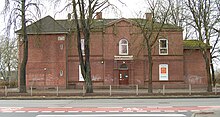professional school
A vocational school forms the school part of dual vocational training in German-speaking countries . Their forerunners are the holiday school founded around 1800 and the advanced training school in Prussia after 1870.
Germany

The vocational school has been a type of school in the field of vocational schools since 1871 . Vocational schools were called advanced training schools until 1912 . The vocational school provides the trainees with the content determined by the framework curriculum or the curriculum of the respective location during their vocational training . It is one of the two pillars of dual training . Its task is to promote general education and the respective technical education.
The vocational school has one to two vocational school days with 8 to 12 hours of lessons per week, depending on the profession and the year of training. The lesson time can also be combined into lesson blocks lasting several weeks . In Germany, this form is particularly chosen for training occupations with a small number of trainees (so-called splinter occupations or occupations in the public service, such as administrative clerk or specialist for labor market services ) if these are taught in regional or federal specialist classes.
The rest of the time, i.e. the majority of the time, is at least intended to be used to convey the content prescribed in the framework training plan in the company with which the training contract was concluded.
The vocational school and thus the entire training concludes with a final examination before a “competent body” - as the term from the Vocational Training Act. In Germany these are, for example, the chambers of industry and commerce (IHK), the chambers of crafts (HWK), the bar associations or administrative schools (also known as “study institutes”).
The successful completion of the vocational training is proven after finishing vocational school and passing the final examination in Germany with the final certificate. Traditionally in Germany the terms journeyman's certificate (in the handicraft ), skilled worker certificate (in the technical professions in industry ) or the IHK examination certificate (mostly in the commercial professions) are still used for this.
The duration of training in Germany is 2 to 3.5 years, depending on the profession. In Germany there are no formal requirements for starting training; However, a is in most cases from plants main -, Realschulabschluss or high school or the corresponding qualification required.
See also:
The Vocational Training Act of the Federal Republic of Germany provides for a so-called dual vocational training system . Apprentices are trained at two learning locations. One of them is the vocational school , the other the training company . While the practical training takes place in the training company , general and theoretical content should be conveyed in the vocational school. However, in the vocational schools there are also training workshops with practical lessons in the sense of the work school . Today this is called action-oriented teaching . The legal basis for this is the framework curriculum and the guidelines for the relevant subjects. General subjects such as German, politics and theoretical subjects, which differ depending on the occupation, are taught, but also practical subjects.
For trainees, physical attendance is compulsory at the vocational school, the performance is confirmed with a vocational school certificate. The trainer is obliged to encourage trainees to attend vocational school. The successful completion of the vocational school usually enables, depending on the federal state , further school visits.
In most cases, vocational schools are assigned to manual or commercial professions . The vocational schools are supervised by the respective responsible school supervisory authorities . They are subject to the school laws of the respective federal state.
Austria
Switzerland: vocational school
Since 2004, the vocational schools are called in Switzerland vocational schools . The successful completion of the vocational training is proven after finishing vocational school and passing the final examination in Switzerland with the certificate of proficiency. The training period in Switzerland is three to four years. There are no formal requirements for starting training in Germany or Switzerland; the selection takes place solely by the companies.
The number of teaching days and hours depends on the apprenticeship, the year of the apprenticeship and the respective vocational school, but the curriculum specifies the number of lessons per topic and subject. Vocational tuition usually includes one exercise lesson per week. In some professions, lessons take place as block lessons .
It is possible to attend the vocational school , a hybrid of vocational school and school , at the same time. In the vocational school, the general educational subjects are then waived.
See also
Web links
Individual evidence
- ↑ From AZ: Das Konversationslexikon; Berlin 1932
- ↑ Horst W. Müller: From the parish school to the MPS , a contribution to the school history in the former parish Hartenrod, today Bad Endbach , In: Hinterländer Geschichtsblätter, 97th year, No. 2, July 2018, pages 174 and 175, Biedenkopf
